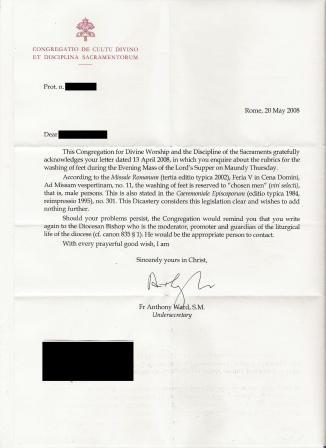Thank Father Zuhlsdorf @ WDTPRS
Brace yourselves. In the week’s ahead, as we move into Lent, enemies of the Pope will no doubt remember that he changed the Good Friday prayer for Jews in the 1962MR. Then the whole anti-Jewish thing will have another round in the news cycle.
In the week’s ahead, as we move into Lent, enemies of the Pope will no doubt remember that he changed the Good Friday prayer for Jews in the 1962MR. Then the whole anti-Jewish thing will have another round in the news cycle.
But there is another yearly controversy we should get ready for.
Si vis pacem, para bellum.
The Church clearly … crystal clearly… states that in the optional Mandatum ceremony of the washing of feet on Holy Thursday, only men should be chosen. Let’s state that again: only men must have their feet washed in this optional ceremony on Holy Thursday.
Yet many priests and bishops – who like to have their own rules followed – simply blow that off and do what they want in this regard, to the consternation of many.
A reader sent me a copy of this interesting letter addressed to him from the under-secretary of the Congregation for Divine Worship and Discipline of the Sacraments, Fr. Anthony Ward.
The salient part:
According to the Missale Romanum (teria editio typica 2002), Feria V in Cena Domini, Ad Missam vespertinam, no. 11, the washing of feet is reserved to "chosen men" (viri selecti), that is male persons. This is also stated in the Caeremoniale Episcoporum (editio typica 1984, reimpressio 1995), no. 301. This Dicastery considers this legislation clear and wishes to add nothing further.
Should your problems persist, the Congregation would remind you that you write again to the Diocesan Bishop who is the moderator, promoter and guardian of the liturgical life of the diocese (cf. canon 835 §1). He would be the appropriate person to contact.
At this point, you will be saying "But Father! But Father!", with hands trembling in frustration. "What if the local bishop is the one who is violating this clear legislation? Would that Dicastery have anything further to say then?"
I don’t know. But the Congregation does have an address and a fax machine, were you to have printed evidence that there are plans to wash the feet of female persons… you know, non-males… the opposite of viri selecti.
"But Father! But…"
Yes… I know what you are about to ask.
Remember that the CDW’s document Redemptionis Sacramentum par. 184 reaffirms the right of every Catholic to have recourse directly to the Holy See. People may write directly to Rome to express concerns. Sure, it is best to work your way up the ladder, as it were, with respect and with charity… and concrete evidence.
But people can write to the Congregation at any time during the process. And that, in fact, seems to be necessary when there is little or no hope of local recourse.
Should people make a fuss over this?
That is up to you. I think that the Sacred Triduum is important. The rite of the Mandatum is important. Our right to have our rites celebrated correctly by our shepherds is important.
Make up your own mind.
Redemptionis Sacramentum includes this toward the end of the document (my emphases):
[183.] In an altogether particular manner, let everyone do all that is in their power to ensure that the Most Holy Sacrament of the Eucharist will be protected from any and every irreverence or distortion and that all abuses be thoroughly corrected. This is a most serious duty incumbent upon each and every one, and all are bound to carry it out without any favouritism.
[184.] Any Catholic, whether Priest or Deacon or lay member of Christ’s faithful, has the right to lodge a complaint regarding a liturgical abuse to the diocesan Bishop or the competent Ordinary equivalent to him in law, or to the Apostolic See on account of the primacy of the Roman Pontiff. It is fitting, however, insofar as possible, that the report or complaint be submitted first to the diocesan Bishop. This is naturally to be done in truth and charity.
CONCLUSION
[185.] “Against the seeds of discord which daily experience shows to be so deeply ingrained in human nature as a result of sin, there stands the creative power of the unity of Christ’s body. For it is precisely by building up the Church that the Eucharist establishes fellowship among men.” It is therefore the hope of this Congregation for Divine Worship and the Discipline of the Sacraments that also, by the diligent application of those things that are recalled in this Instruction, human weakness may come to pose less of an obstacle to the action of the Most Holy Sacrament of the Eucharist, and that with all distortion set aside and every reprobated practice removed, through the intercession of the Blessed Virgin Mary, “Woman of the Eucharist”, the saving presence of Christ in the Sacrament of his Body and Blood may shine brightly upon all people.
[186.] Let all Christ’s faithful participate in the Most Holy Eucharist as fully, consciously and actively as they can, honouring it lovingly by their devotion and the manner of their life. Let Bishops, Priests and Deacons, in the exercise of the sacred ministry, examine their consciences as regards the authenticity and fidelity of the actions they have performed in the name of Christ and the Church in the celebration of the Sacred Liturgy. Let each one of the sacred ministers ask himself, even with severity, whether he has respected the rights of the lay members of Christ’s faithful, who confidently entrust themselves and their children to him, relying on him to fulfill for the faithful those sacred functions that the Church intends to carry out in celebrating the sacred Liturgy at Christ’s command. For each one should always remember that he is a servant of the Sacred Liturgy.
No comments:
Post a Comment